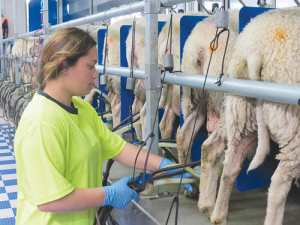Blue River Dairy eyes new markets after China success
Sheep infant nutrition maker Blue River Dairy is hoping to use its success in China as a springboard into other markets in future.
 Younger people’s quest for unique foods will be a key driver in the growth of the sheep milk industry, says US expert Davie Thomas.
Younger people’s quest for unique foods will be a key driver in the growth of the sheep milk industry, says US expert Davie Thomas.
Younger people's quest for unique and interesting foods will be a key driver in the growth of the sheep milk industry.
That’s the view of Professor David Thomas, from the US, who spoke at last week’s dairy sheep conference in Palmerston North.
Thomas has been researching sheep at the University of Wisconsin for 40 years, spending at least half that time on dairy sheep.
In the unique foods category sheep milk products fit perfectly – notably cheese. The last 20 years has seen a marked increase in imports of sheep cheeses.
“The US imports about 50% of world exports of sheep milk cheese and we currently produce a very, very small amount of it. So there is potential for growth in our domestic market. The main countries we import from are Italy, Spain, Greece and France.”
But the US dairy sheep industry is small and most of the sheep flocks are relatively small, averaging about 150 ewes. New Zealand has more and larger flocks than the US.
The US dairy sheep industry is mainly in the Midwest, Wisconsin and the north-east.
“Interestingly, New York would probably be the biggest state for dairy sheep production,” he says.
A large sheep dairy industry is developing in Canada, especially southern Ontario and Quebec. However, hard data is lacking: there are no national records on the dairy sheep industry in all North America.
Sluggish growth seen in the US dairy sheep industry is a pity because sheep milk is very ‘efficient’: it has a much higher solids content than either cow or goat milk.
“It takes five kilograms of sheep milk to make a kilo of sheep milk cheese, whereas it takes 9-10 kg of cow or goat milk to make a similar amount of cheese.”
A big challenge for dairy sheep farmers is getting a market for their raw product, says Professor Thomas. Many people are interested in coming into the industry, but not to process the product; instead they want to produce raw milk.
“The challenge is finding processors who are willing to try sheep milk and develop artisan cheeses out of that sheep milk,” Thomas explains.
Another challenge is getting production to levels where they provide a reasonable return on investment. Thomas says there is nothing in the US to provide impetus to lift production.
He’s aware of the recent initiatives in NZ to improve the genetics of the dairy sheep industry, an excellent move that will improve the profitability of the NZ industry, he says.
And he is impressed that NZ has developed sheep milk powders, something not done in the US.
The National Wild Goat Hunting Competition has removed 33,418 wild goats over the past three years.
New Zealand needs a new healthcare model to address rising rates of obesity in rural communities, with the current system leaving many patients unable to access effective treatment or long-term support, warn GPs.
Southland farmers are being urged to put safety first, following a spike in tip offs about risky handling of wind-damaged trees
Third-generation Ashburton dairy farmers TJ and Mark Stewart are no strangers to adapting and evolving.
When American retail giant Cosco came to audit Open Country Dairy’s new butter plant at the Waharoa site and give the green light to supply their American stores, they allowed themselves a week for the exercise.
Fonterra chair Peter McBride says the divestment of Mainland Group is their last significant asset sale and signals the end of structural changes.